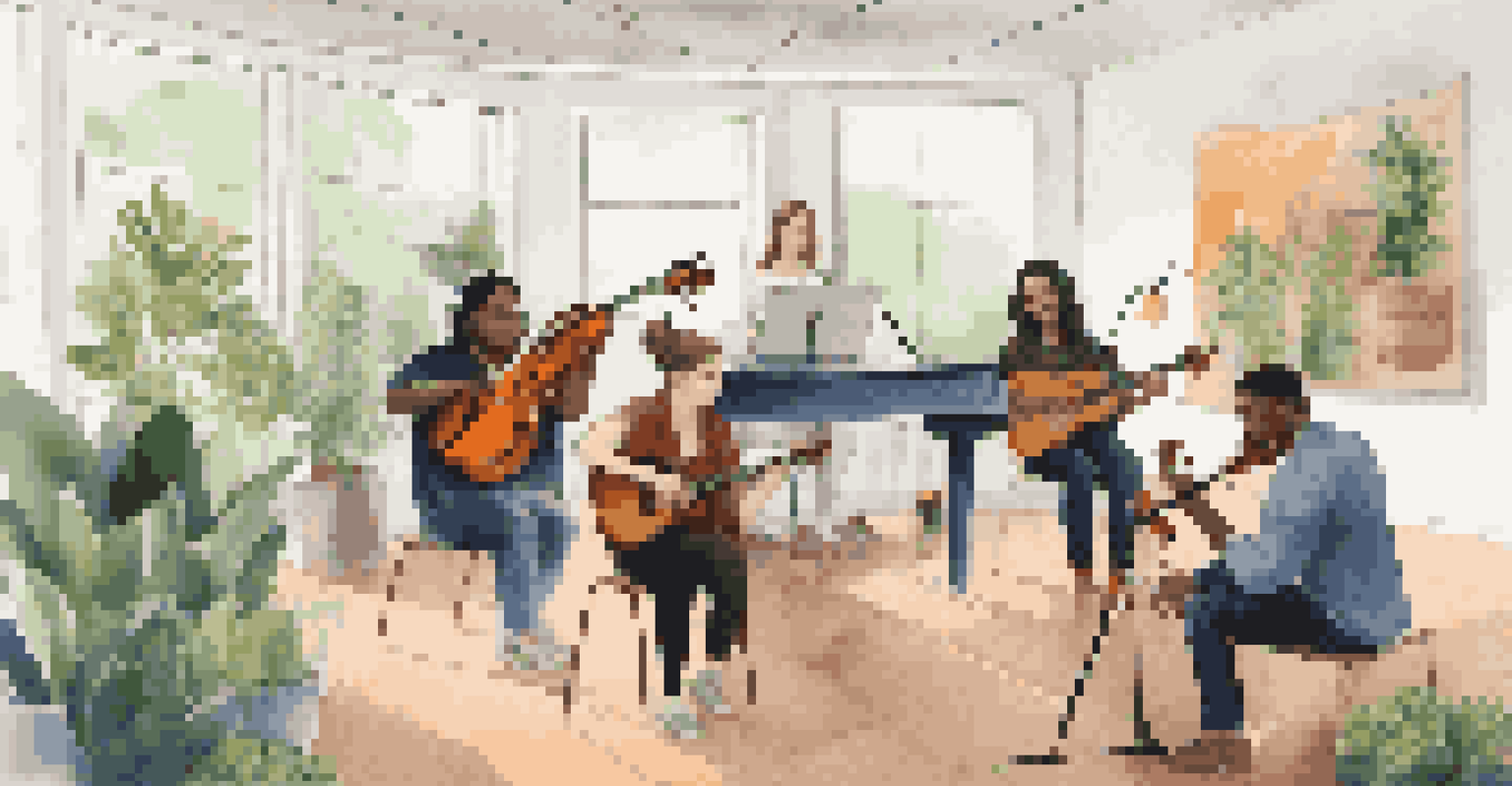Enhancing Music Listening Skills with Technology Integration

Understanding the Basics of Music Listening Skills
Music listening skills are essential for appreciating and analyzing music deeply. These skills involve recognizing elements like melody, rhythm, and harmony. Just as a painter understands color theory, a music listener can benefit from understanding these foundational aspects.
Music can change the world because it can change people.
By developing these skills, listeners can enhance their overall musical experience, whether they are enjoying a favorite song or exploring a new genre. It’s not just about passive enjoyment; it's about engaging with the music on a more meaningful level.
With technology at our fingertips, we can use various tools to improve these skills and make the learning process both fun and effective. Let’s explore how integrating technology can elevate our music listening journey.
The Role of Music Apps in Skill Development
Music applications have revolutionized the way we consume and learn about music. Apps like Spotify and Apple Music not only provide access to millions of songs but also offer curated playlists that can help listeners discover new styles and genres. This exposure is crucial for developing a more nuanced understanding of music.

Additionally, many apps incorporate features like lyrics display, which allows listeners to connect more deeply with the song's narrative. By singing along, users can also improve their vocal skills and pitch recognition, enhancing their overall musicality.
Enhancing Skills with Music Apps
Music applications provide curated playlists and features that deepen listeners' understanding and appreciation of various genres.
These platforms often employ algorithms that suggest music based on listening habits, encouraging exploration and growth. This personalized experience can significantly enhance one’s music listening skills over time.
Using Online Courses to Advance Music Knowledge
With the rise of online learning platforms, anyone can take music courses from the comfort of their home. Websites like Coursera and Udemy offer classes on music theory, ear training, and history, which are instrumental in enhancing listening skills. These structured courses provide valuable knowledge that can transform a casual listener into a more informed one.
Without music, life would be a mistake.
Many courses incorporate interactive elements, such as quizzes and exercises, to reinforce learning. By engaging with the material actively, users can internalize concepts more effectively, making their listening experience richer.
Moreover, the flexibility of online courses means that learners can progress at their own pace, allowing for a deeper dive into topics that interest them most. This self-directed approach fosters a love for music that can last a lifetime.
Interactive Tools for Ear Training and Recognition
Ear training is a critical component of developing listening skills, and technology has made this easier than ever. Websites and apps like ToneSavvy and EarMaster offer exercises that help users identify intervals, chords, and scales. These tools often feature gamified elements, making the learning process engaging and motivating.
Practicing ear training regularly can sharpen a listener's ability to recognize musical patterns, enhancing their overall enjoyment and appreciation of music. It’s akin to learning a new language; the more you practice, the more fluent you become.
Online Courses Boost Music Knowledge
Online learning platforms offer structured music courses that help transform casual listeners into informed music enthusiasts.
Additionally, these tools often provide feedback, allowing users to track their progress and identify areas for improvement. This immediate reinforcement can be incredibly beneficial for maintaining motivation and focus.
Engaging with Music Communities Online
Joining online music communities can significantly enhance your listening skills by exposing you to diverse perspectives and insights. Platforms like Reddit and Facebook host groups where music enthusiasts share their thoughts on various genres, albums, and artists. Engaging in discussions can deepen your understanding and appreciation of music.
These communities often organize listening parties and challenges, encouraging members to explore new music together. This collaborative approach can make discovering new artists and genres more enjoyable and enriching.
Furthermore, receiving feedback from fellow music lovers can provide fresh insights and encourage you to think critically about what you hear. This interaction creates a supportive environment for growth and learning.
Leveraging Podcasts for Music Analysis
Podcasts have emerged as a fantastic way to dive deeper into music analysis. Many music-focused podcasts dissect songs, albums, and artists, providing listeners with context, history, and expert opinions. This additional information can transform how you listen, allowing you to appreciate the nuances you might have otherwise missed.
For instance, a podcast episode on a classic album can reveal the creative process behind the music, shedding light on the artist's intentions and influences. This background knowledge enriches your listening experience, making it more immersive.
Community Engagement Enriches Listening
Joining online music communities fosters collaboration and diverse perspectives, enhancing listeners' music appreciation and discovery.
Moreover, podcasts allow you to explore various genres and styles that you may not usually consider. By exposing yourself to different musical perspectives, you broaden your musical palette and enhance your listening skills.
Incorporating Smart Devices into Listening Experiences
Smart devices, such as voice-activated speakers, have transformed how we listen to music. With just a simple voice command, you can access vast libraries of music, playlists, and radio stations, making it easier to discover and enjoy new sounds. This convenience encourages more frequent music listening, which is essential for skill development.
Additionally, many smart speakers come equipped with features that allow for personalized music recommendations based on your listening history. This tailored approach helps you discover music that resonates with your tastes while also challenging you to explore new genres.

Moreover, some devices offer built-in educational features, like music trivia or artist biographies. These tidbits of information can deepen your understanding of the music and its context, enhancing your overall listening experience.
The Future of Music Listening Skills with Tech Advancements
As technology continues to evolve, so will the methods we use to enhance our music listening skills. Virtual reality (VR) and augmented reality (AR) are beginning to make their mark in the music world, offering immersive experiences that can transform how we engage with music. Imagine attending a virtual concert where you can interact with the music and artists in real-time!
These advancements could lead to new ways of learning and experiencing music, making it more accessible and engaging for everyone. As these technologies become more mainstream, the potential for growth in listening skills is immense.
Ultimately, the integration of technology in music listening not only enhances our skills but also makes the experience more enjoyable. Embracing these innovations can lead to a deeper appreciation and understanding of music, allowing us to connect with it in ways we never thought possible.